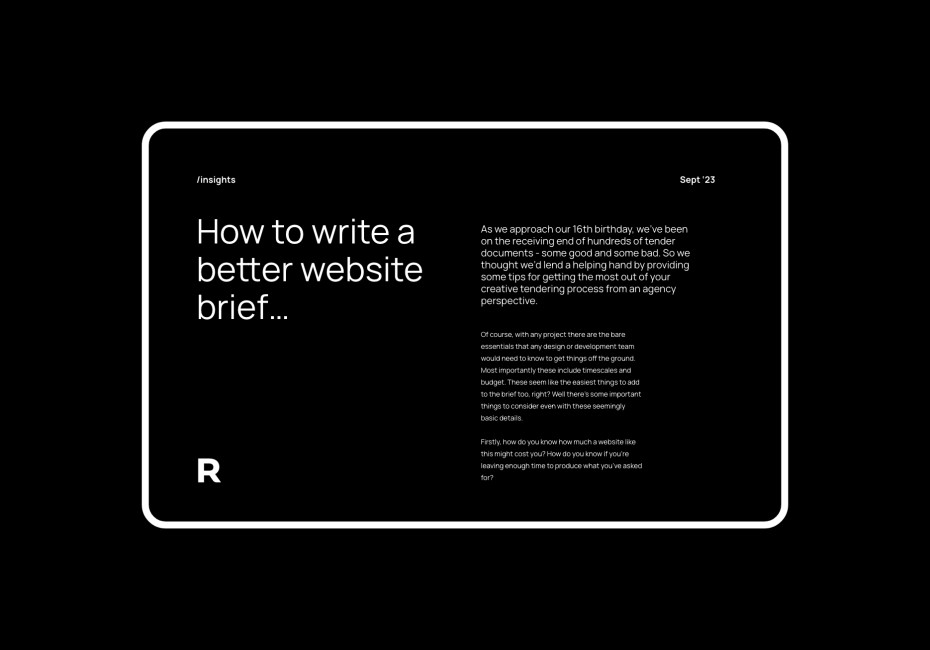Related services
As we approach our 16th birthday, we’ve been on the receiving end of hundreds of tender documents - some good and some bad. So we thought we’d lend a helping hand by providing some tips for getting the most out of your creative tendering process from an agency perspective.
Tip #1
Budget & Timeframe (AKA ‘the essentials’)
Of course, with any project there are the bare essentials that any design or development team would need to know to get things off the ground. Most importantly these include timescales and budget. These seem like the easiest things to add to the brief too, right? Well there’s some important things to consider even with these seemingly basic details.
Firstly, how do you know how much a website like this might cost you? How do you know if you’re leaving enough time to produce what you’ve asked for?
How long does a website take to design and build?
A website can take anywhere from a couple of months to a year or maybe even longer and it all depends on its scale, functionality and complexity. You wouldn’t believe how many tender docs we’ve received that have allocated more time for the tendering process itself than to the design and build of the new website.
As a rough guide, if you have a website that’s large enough to be tendering for then you’re most likely looking at a timeframe of at least 5-6 months. This will allow your chosen agency or studio more time to consider their design solution and to deliver a website with all the bells and whistles you’re hoping for.
How much does a website cost?
That’s a trickier beast. If you’re providing a budget in the brief (and you should) then what you’re doing is setting a ceiling height on what your providers will offer you (and if that’s what you can comfortably afford then of course that’s the right thing to do).
If your brief outlines a budget of £20k for example, don’t be surprised to receive most responses coming in at £19,999.99 - that’s because providers will be offering you everything they possibly can within your budget. In all likelihood, to create the website they’d like to make for you, using all the skills and tools they have available to them, most providers would actually propose a budget closer to £30-40k, so with a ceiling budget there will always be certain tools and processes that will have been held back in any proposal.
With this in mind, it might actually be more fruitful to provide a budget range (e.g. £20-30k), explaining that, whilst you’d like to deliver the project as economically as possible, you wouldn’t be averse to suggested extras that would benefit the delivery of the project. If you’re doing something like this of course, make sure to specify that any recommended extras are itemised within the budget so that measuring the cost of the core website remains a level playing field.
How to calculate a budget for your new website
If you’re still not sure even where to start on budgeting for the project then there are two routes:
Contact a number of agencies for a rough ballpark - nothing specific and nothing you’ll hold them to but just a rough idea of what a website like XYZ might cost and how long it might take to design and build on average.
Contact an agency for a paid ‘Discovery’ and ‘Scoping’ exercise. This will likely involve a number of meetings and workshops and would provide you with a much more accurate understanding of the problems you’re trying to solve and the specification, budget and timescales for the website. The results of which can be shared as part of the tender brief and give your chosen design team a head start once they’re awarded the project.
Tip #2
Defining your goals
Designers are problem-solvers and to really get the most out of your new website, you must first define the key drivers and core issues that you’re trying to resolve. Maybe you have some ambitious targets to hit or your goal is simply to improve the navigation across the site and engage with your audience more fully. The more information you can provide in your brief the better. Again, if you’re not sure where to start then a discovery and scoping phase might be a useful exercise for you.
Tip #3
Defining the specification
The specification of your website would cover things like important functionality, integrations with other third party systems like your CRM, long-term support expectations and content management system (CMS) requirements.
The key here is to be specific but not too specific… For an agency putting in the time to write a tender response, they need to know that they have a reasonable chance of being considered for the project. If you’ve listed Wordpress as a must-have CMS for example, then you’re eliminating a whole world of other possibilities from agencies specialising in other similar systems.
Instead, continuing with the Wordpress example, if you’re comfortable using this platform then try to think about what it is that you like about it. So for instance it might be that you need an ‘easy to use and well-established CMS’, perhaps you’re looking for an ‘editor that allows for multiple admin levels’ and so on. By focusing on the features you need rather than how it’s packaged, you’ll keep your options open.
Tip #4
Gauging experience
It’s understandable that to be truly confident that a provider can achieve what you’re looking for, you might want to see an example that’s very close to the image you have in your head. It’s also understandable that you might want to work with an agency that has specialised within your sector. Makes sense.
Specifying that a proposal must include 3 examples, within the last 12 months of websites just like yours, for a company just like yours at a budget the same as yours however, is going to limit your talent pool somewhat. The problem with this approach is that you can inevitably end up with a blinkered response that hasn’t had the benefit of a more worldly experience in the world of web. So often, for instance, we’ll take inspiration from projects we worked on across totally unrelated projects in sectors far removed from one another.
Much like with the specification - try not to be too specific here. If you’re working with a great design team then the sector and the task are irrelevant, if the development team are up to scratch then they can build a solution that’s right for you no matter what.
A number of projects we’ve tendered for in the past have also asked for CVs and qualifications of the people that would be involved in the project should we win. We’d question the value of this information for what is essentially a creative role. Years of experience are important - agreed, but not all of the best designers and developers have a degree… is that really a deal breaker for the project?
Tip #5
Presentations vs interviews
Think carefully - are you appointing a specialist in delivering presentations or a specialist in building websites? By this point, an agency will have speculatively spent upwards of a week working a proposal for the project - have mercy on them and conduct an informal interview rather than asking them to prep and rehearse for a presentation as well.
Tip #6
Never ask for a design
This should have been tip number 1: Please, please, please don’t ask agencies to produce a design as part of their tender response!
Commissioning a design team without seeing exactly what they’re going to offer can be a scary concept but by skipping several important steps at the start of a new website project, any visuals you receive will be half-baked and not really an accurate representation of the agency’s true creative skills.
Think of it this way - imagine you’re starting a relationship with your new website. Do you want to love it just for its looks or do you want a connection that’s more than skin deep? If you jump in too soon based on looks alone, you might find that (even though it looks great on Instagram) further down the line you realise you have different interests, it doesn’t really get on with your friends and deep down you want different things.
Instead, be patient with the design process and ask for a portfolio of recent examples that provide evidence that the agency can deliver on their promises including client testimonials.
TLDR
Do your homework when it comes to pricing and timescales
Define your goals and KPIs
Give a non-specific spec
Don’t be afraid of a varied portfolio
Ask for interviews, not presentations
Respect the process: Never ask for a design. Not ever.
We hope you find these tips useful when writing your next website brief. If you need any help with ballparks or would like to talk to us about a discovery process too then we’d love to hear from you.
For more news follow us @rootstudiouk
Similar posts

In a world crammed with endless scrolling, pop-ups, flashing offers and ‘read more’ rabbit holes, the real competition isn’t just other businesses - it’s cognitive overload.

Most websites don’t have a traffic problem - they have a conversion problem. Conversion Rate Optimisation (CRO) is simply about spotting issues and opportunities and gently guiding more of your visitors to take action.

